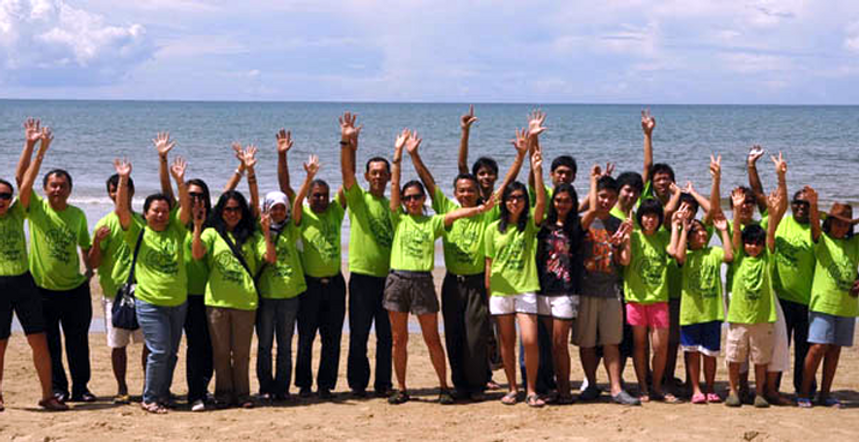
GREEN SURF
(SABAH UNITE TO REPOWER THE FUTURE)
As an overview, the proposed site identified for the power plant was sandwiched between the famous Tabin Wildlife Reserve, which is home to Sabah’s remaining critically endangered Sumatran Rhino population, and the Sulu Sulawesi Marine Ecoregion, which forms part of the Coral Triangle, one of the richest marine areas in the world. Coal supply was to have been imported from Kalimantan in Indonesia, and sent via barges through a sea route.
Green SURF mobilised advocacy and awareness campaigns through numerous Press releases, a blog, Facebook and a signature drive to petition the Government to cancel the proposed plant. One of the coalition’s first efforts was to hold a “green party” in December 2009 in Kota Kinabalu city, to share the negative impacts of a coal plant, and why the Government should opt for clean solutions for Sabah, a state known for its terrestrial and marine wonders. To further spread its message, Green SURF sold striking green t-shirts with the words “Unite for a Greener Future” and “It Ain’t Green, its BLACK!”. Wrist bands with the slogan “If you love Sabah – NO COAL!” became an instant hit, and are worn even until today.
Perhaps the most significant effort was Green SURF commissioning Professor Daniel Kammen, a renowned energy expert from the University of California in Berkeley, to write an energy options report for Sabah. The report highlighted both cleaner and renewable energy alternatives, cost analyses, and national policy recommendations. The report titled “Clean Energy Options for Sabah,” proposed alternatives to the coal-fired power plant that comprise a mix of biomass waste, hydropower, solar, wind and geothermal energy sources. Copies of the report were subsequently sent to the Malaysian Prime Minister and the Parliament, the Sabah Chief Minister and the State Government, and a number of other top officers. The report is available on line at this link. (please make sure link works).
Professor Kammen, who is now on the LEAP Board, was one of several speakers at a public forum to provide details on the “Energy Options for Sabah” report. The Green SURF event on 20th March, 2010 saw over 400 people turning up to hear views from Sabah Electricity Sdn Bhd, the Malaysian Palm Oil Board, PACOS Trust, WWF-Malaysia and the Sabah Environmental Protection Association. This was one of the few times the public were given a chance to speak out and ask questions on what was viewed as a highly controversial project. For the record, two previous attempts to introduce coal for power in Sabah had also failed when proposed at different sites. The ‘coal issue’ became one of the hottest and most talked about topics in Sabah, and continues to dominate conversations on energy options for the state.
Founded on October 31, 2009, Green SURF — short for Sabah Unite to Re-Power the Future – evolved from merely opposing dirty energy from sources such as coal, to finding ways for renewable and cleaner sources of power for the Malaysian state of Sabah. The day LEAP joined hands with four other prominent local NGOs to form the Green SURF coalition became a turning point for the civil society movement – one that saw organisations with different goals coming together for the common aim to say no to what would have been Sabah’s first coal-fired power plant. Following an intense campaign that lasted almost two years, the Malaysian government cancelled the proposed plant on February 16, 2011.
The historic formation took place at Tanjung Aru beach in Kota Kinabalu, a place close to the heart of many Malaysians of Sabah origin, and symbolic of the vulnerability of coastal areas to global warming and sea level rise.
The coalition was jointly founded by LEAP, the Sabah Environmental Protection Association (SEPA), Malaysian Nature Society (MNS) Sabah, Partners of Community Organisations (PACOS) Trust and WWF-Malaysia. Other groups and individuals in Sabah showed strong support for Green SURF.

